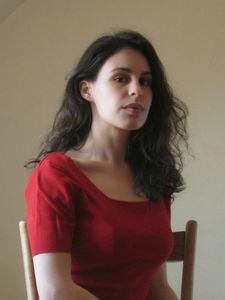Catherine Fatima on her Raw & Frank Auto-Fictional Debut Novel, Sludge Utopia
Catherine Fatima's debut novel Sludge Utopia (Book*hug) is as ambitious as it is raw, exploring sexuality and desire as conceptual experiences while still grounding the narrative in a deeply introspective, visceral voice. In this work of auto-fiction, the character Catherine travels to France and Portugal and back to Toronto, pushing herself to interrogate not only desire but the internalized misogyny contained within it.
The book has already earned praise from no less than Sheila Heti, who raved: "Few recent novels have absorbed me so completely, and filled me with this kind of plain admiration... It leaves me feeling as though I had discovered a female, 21st century Henry Miller for all its unfiltered engagement in the raw and the real."
We're excited to welcome Catherine to Open Book today, when we get to know her through our Lucky Seven interview. She tells us about the question at the heart of Sludge Utopia, shares what she needs most during the writing process, and offers an eclectic list of influences for her upcoming second book project that will leave you eager for its publication.
Open Book:
Tell us about your new book and how it came to be.
Catherine Fatima:
My new book—my first book—is called Sludge Utopia, and it is a work of auto-fiction kneading together episodes of sex, friendship, communality, depression, invigoration, and the French continental philosophy read in and alongside an undergraduate degree in literary theory. It came to be once I realized I had put so many hours into writing as a method for working through life’s confusion that I should put just enough longer into it that something lasting could be made from that labour.
OB:
Is there a question that is central to your book, thematically? And if so, did you know the question when you started writing or did it emerge from the writing process?
CF:
There is. Yes. The question is whether desire can be seized upon for a creation of a utopian future or if it, bound to re-enactments and the pessimism of past subjection, is necessarily a conservative hinderance. You have to read to the end of the book to find out. Just kidding. Desire can do whatever you feel.
OB:
Did this project change significantly from when you first started working on it to the final version? How long did the project take from start to finish?
CF:
Between the first drafts of passages that appear in the book and now, its release, about five years have passed. It is completely different in too many ways to detail.
OB:
What do you need in order to write – in terms of space, food, rituals, writing instruments?
Your CanLit News
Subscribe to Open Book’s newsletter to get local book events, literary content, writing tips, and more in your inbox
CF:
I need a lot of time and a lot of revision. I need to be reading many other books, and I need a few seasonal passages. I write freehand before typing things up, and make most of my revisions while typing, drawing thematic connections between things written discretely.
OB:
What do you do if you're feeling discouraged during the writing process? Do you have a method of coping with the difficult points in your projects?
CF:
I wish.
OB:
What defines a great book, in your opinion? Tell us about one or two books you consider to be truly great books.
CF:
OK—I had a discussion with Montreal poet Alex Manley recently, as regards literary prizes. In his presence and defending myself against the prospect that I may not ever get any, I decided that a truly great book is one that forges the space for its own understanding—a book that works within some theoretical tradition and expands it, not one that attempts a recreation of form already agreed upon as ‘good’. Frankly, I don’t care very much about craft. I’m reading Silvia Federici for the first time right now, embarrassingly. Revolution at Point Zero: this is a great book.
OB:
What are you working on now?
CF:
I am working on a second novel about a communal household. If the psychic influences on my first novel are Roland Barthes, Adam Phillips, and Simone Weil, those on my second are Jarett Kobek, Lee Edelman, It’s Always Sunny in Philadelphia, and hit 1973 Franco-Italian comedy La Grande Bouffe.
_______________________________
Catherine Fatima is a writer who was born, raised and currently lives in Toronto. Sludge Utopia is her first book.



